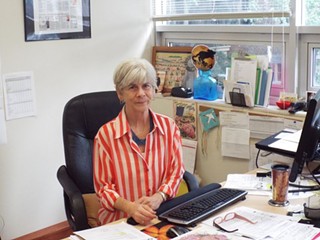One in four people in Savannah lives in poverty. That number hasn't changed much in decades.
For some people, that just means government has failed. It means the poor must be doing something wrong. And it’s a green light to apathy.
But for Suzanne Donovan, it just means work to do.
“Poverty is a defining issue for this city,” Donovan says. “It’s a core issue of who we are.”
Donovan recently was picked to lead the city’s anti-poverty initiative, Step Up Savannah. She takes over from the non-profit organization’s founding director, Daniel Dodd-Ramirez, who stepped down earlier this year after nine years at the helm.
Her aim—reducing poverty—sounds diffuse. There’s nothing to hold onto there. It’s when she starts talking about education and workforce development that things start to connect.
“We’ve got a huge percentage of the market that isn’t fully able to participate in the economy,” Donovan says. “And none of us should feel comfortable about that.”
Donovan calls Step Up Savannah a “convening organization.” That means, yes, they do lead people to work through a successful jobs skills development program.
But Step Up won’t reduce poverty on its own. What they do is bring businesses, governments, non-profits and individuals to the table of belief and action.
About 35 percent of their income is from government sources, the rest from private sources. Donovan’s involvement in social justice issues started when she worked for the ACLU in Texas.
“If you imagine that you are an independent actor without all of these networks of support around you, I think you fundamentally don’t understand how the world works,” Donovan says.
“We’re all part of a complex web here. So every one of us has a role to play in it.”
Of course, those are fighting words for some. Call them Ayn Randers. Call them the “poor always will be with you” crowd.
Or just call them hard workers who were there once. Donovan doesn’t shy away from their questions.
What about the poor who waste their money on cigarettes, alcohol and lottery tickets? What about the ones who make themselves prey to high-fee money lenders and check cashers by writing bad checks?
“We frequently hold people who are low income, who don’t have many resources, to a moral standard that is different than one that we hold for our own and for people with a higher income,” Donovan says. “This is one of the issues that goes right to the core of this serious divide that we have in trying to understand each other.”
To her, it’s simply a policy question. Should we regulate title pawns? Should we raise the minimum wage?
And if I give the impression that it’s all hot-button over at Step Up, it’s not. They largely “convene over” policies embraced by local businesses.
These include providing financial education, promoting the Earned Income Tax Credit and improving transportation options for workers. The organization’s hugely successful “poverty simulations” open many eyes to the reality of poverty.
“We talk about wanting to create an economy that attracts higher wage, creative jobs, all of that, I agree with,” Donovan says. “But what does it take to get there? It doesn’t just happen.”
She points to employers like Ikea, DIRRT and Derst Bakery as ones that understand the benefits of poverty reduction. Downtown hotels even moved to create a child care facility for hospitality workers until the bottom fell out of the economy in 2008, she says.
“We can create a caring community together,” Donovan says.
Does it sound like she’s a dreamer? Does it sound like she’s the only one? If it doesn’t, then you’ve already Stepped Up to Donovan’s way of thinking.


























